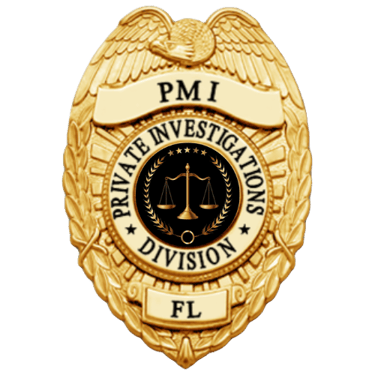
What a Private Investigator in Florida Can Legally Do
What a Private Investigator in Florida Can Legally Do
Investigator Sean Wohl & Co Authored by Investigator Zach Porter
2/3/20254 min read


What a Private Investigator in Florida Can Legally Do
Private investigators (PIs) in Florida play a crucial role in gathering evidence, conducting surveillance, and assisting in legal and civil matters. However, unlike law enforcement, private investigators must operate within specific legal boundaries set by Florida law. At Preventative Measures Investigations (PMI), we are fully licensed under Florida Statute 493 (F.S. 493), which governs private investigative services in the state. Understanding what private investigators can and cannot legally do is essential for clients seeking investigative services.
Florida Private Investigator Licensing & Regulations
Private investigators in Florida must be licensed by the Florida Department of Agriculture and Consumer Services (FDACS), as required by F.S. 493. This statute outlines the qualifications, training, and ethical obligations PIs must adhere to in order to operate legally. At PMI, all of our investigators hold valid Class “C” Private Investigator Licenses, ensuring compliance with state laws and professional standards. Our agency itself is licensed under a Class “A” Private Investigative Agency License, allowing us to conduct a broad range of legal investigations.
Under F.S. 493, private investigators must pass background checks, complete required training, and adhere to strict ethical guidelines. This ensures that investigations are conducted lawfully and that evidence collected can be used in legal proceedings.
What Private Investigators in Florida Can Legally Do
While private investigators have more access to information than the general public, they do not have the same powers as law enforcement officers. However, PIs can legally perform the following investigative services:
Surveillance: PIs can conduct surveillance to gather evidence for legal, business, or personal matters. This includes monitoring subjects in public places, documenting their activities, and capturing video or photographic evidence, as long as privacy laws are not violated.
Background Checks: Investigators can legally obtain and analyze public records, criminal histories, property records, and business filings to provide comprehensive background checks.
Locating Missing Persons: Private investigators can use legal resources to locate missing persons, including long-lost relatives, debtors, or persons involved in legal cases.
Asset Searches: Investigators can track financial and property holdings through legally accessible databases to assist in fraud cases, divorce settlements, and debt recovery.
Infidelity Investigations: PIs can gather evidence in suspected infidelity cases, often through legal surveillance and investigative research.
Fraud Investigations: PMI conducts fraud investigations, including insurance fraud, business fraud, and identity theft cases, by gathering admissible evidence for legal proceedings.
Corporate Investigations: Private investigators can investigate employee misconduct, workplace theft, non-compete violations, and internal business matters.
Witness & Defendant Locates: Investigators can locate witnesses, defendants, or individuals who need to be served legal documents.
Digital & Cyber Investigations: PMI’s Cyber Forensics Division specializes in metadata analysis, online investigations, and tracking digital footprints for cyber-related cases.
What Private Investigators in Florida Cannot Legally Do
While private investigators have extensive legal investigative tools, they must operate within state and federal laws. There are strict prohibitions on certain activities, including:
Impersonating Law Enforcement: A private investigator cannot present themselves as a police officer, government agent, or any law enforcement official.
Making Arrests: Private investigators do not have the authority to make arrests. If illegal activity is discovered, it must be reported to law enforcement.
Trespassing on Private Property: Investigators cannot enter private property without consent. Surveillance must be conducted from legal vantage points where there is no expectation of privacy.
Hacking & Unauthorized Access: PIs cannot hack into personal email accounts, social media accounts, or private databases without legal authorization. All digital forensics conducted by PMI is within the bounds of F.S. 493 and federal regulations.
Placing GPS Trackers Without Consent: Florida law restricts private individuals and investigators from placing GPS tracking devices on vehicles without the owner's consent unless permitted under specific legal circumstances.
Recording Private Conversations Without Consent: Florida is a two-party consent state, meaning it is illegal to record a conversation unless all parties involved have consented.
Engaging in Cases That Require Law Enforcement Authority: Some investigations, such as missing persons cases involving suspected criminal activity, require law enforcement involvement. While PMI can assist in locating individuals, active criminal cases must be handled by the police.
Why We Cannot Take Certain Cases
At PMI, we operate with integrity and within the bounds of Florida law. There are instances where we must decline cases due to legal restrictions or ethical concerns. These include:
Cases That Require Law Enforcement Powers: If a case involves criminal prosecution, arrests, or law enforcement procedures beyond what a private investigator can legally do, we advise clients to contact the appropriate authorities.
Requests to Obtain Confidential or Restricted Information: We cannot access protected information such as medical records, sealed court documents, or unauthorized financial records.
Stalking or Harassment Requests: If an investigation request crosses the line into harassment, stalking, or illegal surveillance, PMI will not take the case.
Unlawful Digital Investigations: We strictly follow laws concerning digital forensics and will not engage in illegal hacking, data breaches, or privacy violations.
Cases That Violate Ethical Standards: If a case involves unethical behavior or a conflict of interest, we reserve the right to refuse service.
Private investigators in Florida serve a critical role in gathering intelligence, conducting surveillance, and assisting legal and corporate clients. However, they must operate within the guidelines of Florida Statute 493 and maintain ethical investigative practices. At Preventative Measures Investigations, we take pride in our fully licensed status, our strict adherence to FDLE standards, and our commitment to conducting investigations legally and ethically.
If you need professional, legally compliant investigative services in Florida, PMI is here to help. Contact us today to discuss your case and how our team can assist within the full scope of Florida law.
